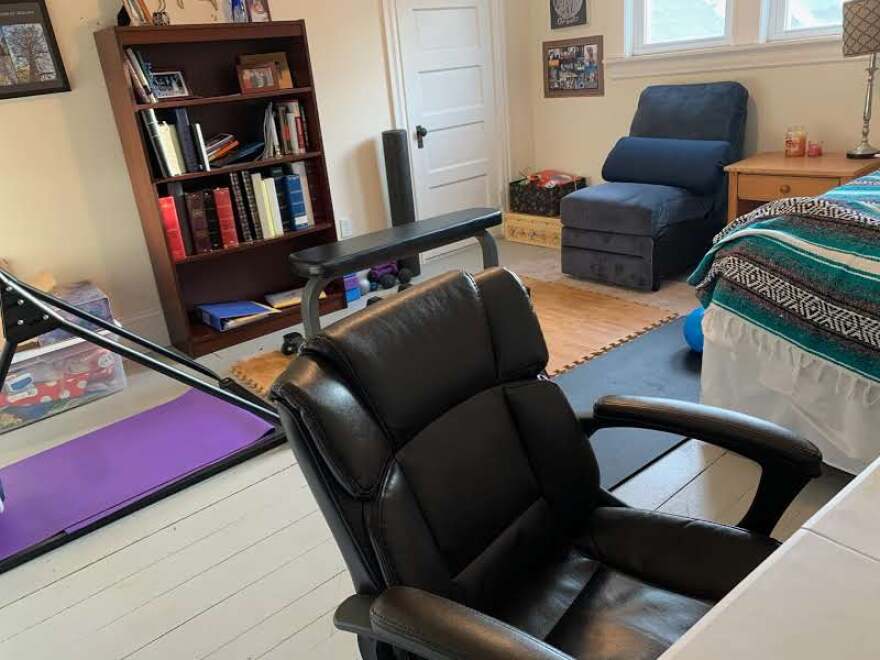For some healthcare providers in New Hampshire, the COVID-19 pandemic has jump-started a move to something they’ve wanted for years: more telemedicine.
But the state's insurance system has been slow to catch up - and it's still unclear if it can last.
Click here to sign up for our coronavirus newsletter to get the latest updates.
Cristin Zaimes runs Oceanside Physical Therapy, a clinic in Stratham focused on pelvic health. She wants people to think of telehealth as more than just a lesser substitute for in-person care.
Zaimes says a lot of her clients come in with pain or symptoms that they've had for decades without knowing why. Their first appointments are mostly just conversation.
"People come to us and then don't quite understand their condition, how it's connected, what they should be doing, the modifications they should make," she says. "So there's a lot that can be done – education, watching movement, guiding exercise."
Zaimes says all of that can happen easily through a screen, making care more accessible and comfortable for people in their homes. She's wanted to do more of this for years, and she sees a huge opportunity right now.
"My hope is that, now that everybody's at home…that we can make time for these appointments, and actually they're potentially more convenient," Zaimes says.
But it hasn't been easy to get started. Most of Zaimes' clients canceled their upcoming appointments, waiting to see what would happen with COVID-19. She laid off many of her staff so they could seek unemployment.
And when it comes to insurance coverage for remote therapy, she says, the advice has been confusing, ever-changing and hard to trust.
"I know how insurance companies work, and there's always question marks and wiggle room for them to deny and it doesn't have to be logical," Zaimes says. "So it's pretty scary."
Click here to make a donation to support NHPR's newsroom.
In the past, providers have made less money for telehealth visits than in-person ones, and haven't been allowed to provide as many services remotely.
Now, insurance companies are under a state emergency order to treat telemedicine as if it were in-person treatment. It's an attempt to keep the health care system functioning during social distancing.
The first weeks of that order were chaotic for major insurance companies in the state as they tried to update their systems. Providers and insurers say plenty of telehealth claims were denied or underpaid, contrary to state directions.

Now, some companies are going through and reprocessing those claims, but there are still lots of kinks to work out. It means more stress for people like Lisa Minahan, who runs Premier Speech Therapy, a clinic with several providers in Londonderry.
"You don't know when your next paycheck is coming in from the insurance companies, yet every week when I run payroll, I have to pay girls," Minahan says.
She and other speech therapists are also eager to provide more teletherapy. Minahan says her young patients' families don't always have time for a trip to the office, and she's long thought more remote appointments could help her reach more people.
But after years of waiting for insurers to cover more telehealth, the pandemic has not been an ideal starting point. When Minahan called one insurance company recently about an issue with a claim, she was faced with a four-hour wait time.
"I'm like, are you kidding me?" she says. "So for us to actually get through to any of the insurance companies to ask questions or to solve our problems or anything right now – like, they are overworked and overwhelmed and it's crazy."
Tyler Brannen, the director of health economics for the state insurance department, says they did get some complaints in the first weeks of the executive order about insurance companies lagging on compliance.
"But I think those issues have been resolved now," he says. "And indeed, every major insurance company operating in New Hampshire does have a very detailed set of billing instructions to get reimbursement and coverage for services virtually."
One notable exception to full compliance is Medicare, which is still limiting the services providers can offer remotely. Provider advocates say they expect that to change soon.
For many in the field, the bigger question is whether any of this will outlast COVID-19 and the forced experiment in telehealth it's created.
Doctors and insurance officials will be looking to see if it saves money or improves patient outcomes. All the new telemedicine visits during the stay-at-home orders will give them plenty of new data.
Providers like Cristin Zaimes hope the word starts to spread to patients that telehealth can help them take care of themselves, even now – and insurance will pay for it.
"I know my family is in financial conservation, so I know that's where everybody else is, not knowing what's going to happen," Zaimes says. "They're going to be conservative with their own self, too, so I think to have coverage right now is essential."
If enough patients are willing to give remote care a try, she says, businesses like hers will survive the downturn, and telehealth will keep catching on.
Click to read telehealth coverage details for Anthem, Cigna, Harvard Pilgrim and Tufts. You can also get the state insurance department's latest coronavirus updates, and read their FAQ.








